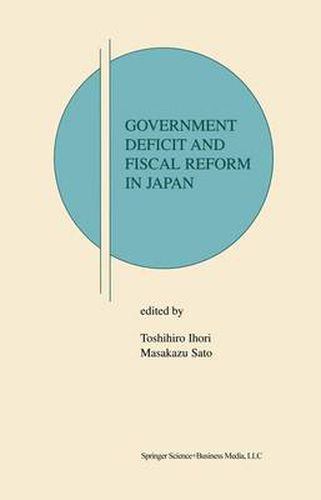Readings Newsletter
Become a Readings Member to make your shopping experience even easier.
Sign in or sign up for free!
You’re not far away from qualifying for FREE standard shipping within Australia
You’ve qualified for FREE standard shipping within Australia
The cart is loading…






This title is printed to order. This book may have been self-published. If so, we cannot guarantee the quality of the content. In the main most books will have gone through the editing process however some may not. We therefore suggest that you be aware of this before ordering this book. If in doubt check either the author or publisher’s details as we are unable to accept any returns unless they are faulty. Please contact us if you have any questions.
This title presents a theoretical-based comprehensive analysis of economic consequences of government deficits and fiscal reform in Japan. Particular emphasis is directed at developing tools that can be applied to theoretically and empirically clarify essential economic concerns in Japan such as generational incidence of fiscal reform and a growing dependence on government bonds for covering financial deficits. The book evaluates the recent movement of Japanese fiscal reform and government deficit. The authors first summarize fiscal policy in 1990’s. Then, they move on to investigate the macroeconomic impact of government department and the sustainability problem, and then discuss benefits and costs of public investment. The political aspect of fiscal reconstruction movements in Japan is also examined. Finally, the authors investigate the behavior of central government’s control on local governments’ debt issuance and its effect on the real activities of local governments. This book points out that the long-run structural fiscal reform is more important than the short-run Keynesian fiscal policy in Japan.
$9.00 standard shipping within Australia
FREE standard shipping within Australia for orders over $100.00
Express & International shipping calculated at checkout
This title is printed to order. This book may have been self-published. If so, we cannot guarantee the quality of the content. In the main most books will have gone through the editing process however some may not. We therefore suggest that you be aware of this before ordering this book. If in doubt check either the author or publisher’s details as we are unable to accept any returns unless they are faulty. Please contact us if you have any questions.
This title presents a theoretical-based comprehensive analysis of economic consequences of government deficits and fiscal reform in Japan. Particular emphasis is directed at developing tools that can be applied to theoretically and empirically clarify essential economic concerns in Japan such as generational incidence of fiscal reform and a growing dependence on government bonds for covering financial deficits. The book evaluates the recent movement of Japanese fiscal reform and government deficit. The authors first summarize fiscal policy in 1990’s. Then, they move on to investigate the macroeconomic impact of government department and the sustainability problem, and then discuss benefits and costs of public investment. The political aspect of fiscal reconstruction movements in Japan is also examined. Finally, the authors investigate the behavior of central government’s control on local governments’ debt issuance and its effect on the real activities of local governments. This book points out that the long-run structural fiscal reform is more important than the short-run Keynesian fiscal policy in Japan.